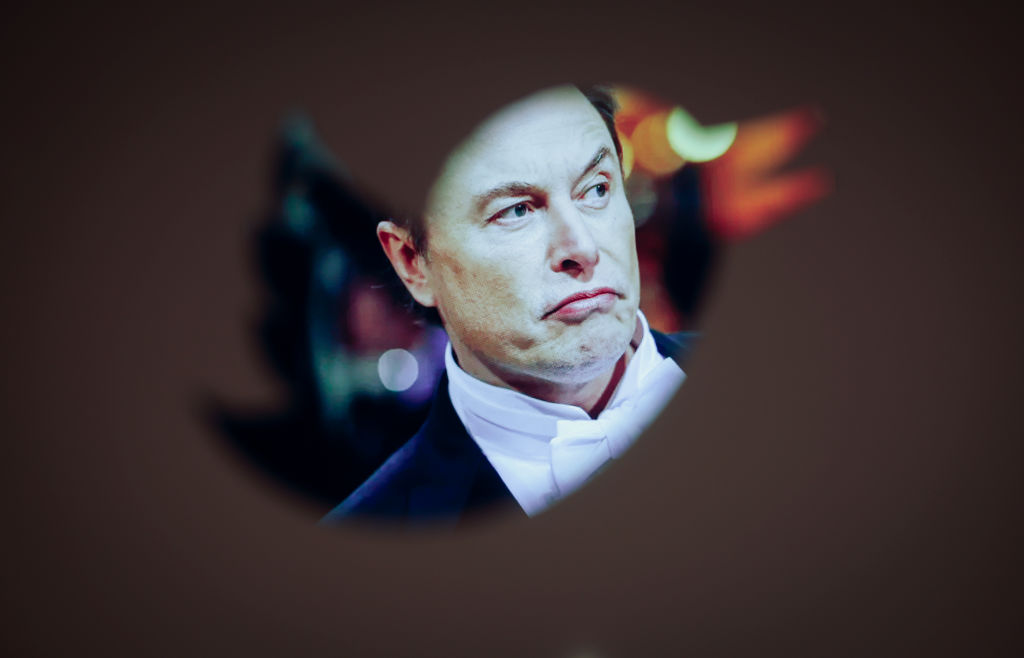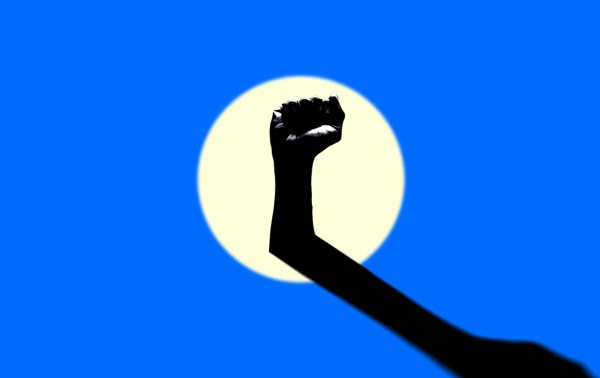I’ve written a few times about Elon Musk and his new kingdom, and each time I have a commenter has popped up to say, “OH MY GOD NO ONE CARES.”
Really? You read this newsletter because you’re interested in populism, don’t you? Well, Musk’s lightning descent from idealistic toppler of the social-media ancien regime to edgelord Robespierre is the most amusing populist story going. Certainly it’s more compelling than Trump shaking down the cult for cash for the 8,000th time or Ron DeSantis offering panem et circenses to anti-vaxxers.
It flatters our priors as Dispatch readers, too. If you suspect that beneath the surface of every self-styled tribune of the people lurks an authoritarian itching to clamp down on his enemies, the last 24 hours at Twitter have you feeling pretty smug.
And it’s legitimately historic. What we’re witnessing right now is, without exaggeration, probably the worst case of social-media brain-poisoning in history. Day by day, in public view, one of the most successful businessmen to ever live is selling off assets and wrecking his productive endeavors to chase the dragon of online attention. Anyone else in Musk’s position would have quickly hired a CEO and assembled a team to execute his vision for the site while he turned his attention back to Tesla and SpaceX. Instead he seems to be working the dials himself, needlessly and manically. It’s as if Jeff Bezos insisted on personally copy editing everything that appears in the Washington Post.
All things considered, Elon would have been better off getting addicted to heroin than to Twitter. His habit would have been cheaper, at least; for what he paid for his current fix, he could have bought all the junk on Earth.
Finally, if Joshua Green and I are right, Musk’s revolution-gone-bad is doing us all a favor by sucking some of the life out of Trump’s 2024 campaign. He’s given MAGA fans an exciting new outlet of daily lib-owning gratification, one that doesn’t require making a proto-fascist coup-plotter president. The sort of person who can’t be truly happy without knowing that some group of Democrats somewhere is angry about something can now scratch that itch safely, to our mutual benefit.
In short, you should be paying attention to Twitter—if only to help me settle on the right metaphor for Musk going forward. Is he a monarch or Montagnard?
Whichever it is, the heads have begun to roll.
Last night’s drama began last month, when Elon was still in his revolutionary idealist phase.
The account that tracks the comings and goings of his plane is, or was, called Elonjet. A few days ago, Musk reported a frightening incident involving his toddler in which a stalker allegedly identified the car the boy was traveling in, blocked it, and climbed onto the hood. Musk blamed Elonjet for having tipped off the public to his son’s whereabouts, but why he came to that conclusion isn’t clear. Per Gizmodo, “open-source intelligence researchers have located where the [incident happened], noting it was nowhere near an airport and roughly a day later than any flight by Musk’s private jet.”
Elonjet was summarily banned from Twitter for “doxxing,” which seems like an overreaction since doxxing is partly a matter of intent. If you post the home address of an antagonist to make them feel unsafe, I’d call that doxxing even though the information is publicly available on white-pages websites. Your intent is to intimidate your enemy by making it easy for would-be harassers to find them. Bans on doxxing are designed to punish and deter that behavior.
Posting the whereabouts of a famous person’s jet isn’t about making them feel unsafe, it’s about speculating what their next professional venture might be. You see it during free-agent season in sports, when a presidential nominee is close to choosing a VP, and at other moments of high cultural suspense. The Elonjet account isn’t trying to help terrorists shoot down Musk’s plane, it’s trying to anticipate what he might be up to business-wise. “Ooooo, Elon’s jet is en route to Xinjiang. Maybe he’s about to open a Tesla dealership inside a Uyghur concentration camp.”
It’s worth noting that flight data is typically available publicly but not quite as available in Musk’s case. He took extra steps to mask the whereabouts of his jet, only to have the Elonjet account unmask it and keep tracking it anyway. Phil Klein is right, however, when he reasons that anyone determined enough to try to shoot Musk’s plane out of the sky or to ambush him at an airport won’t be deterred by the disappearance of a single Twitter account. If anything, Musk has boosted Elonjet’s public profile by picking this fight, an irony not lost on the man himself. If he’s truly worried about his and his son’s safety, why would he do that and risk having the so-called “Streisand effect” drive people to look for information on Musk’s plane on Facebook, Instagram, or other social-media sites where it isn’t banned?
Still, we might cut him some slack on banning Elonjet. One can understand why a man would overreact after a scare involving his child, particularly a man who has to worry about threats in a way few other human beings do. But cutting him slack doesn’t mean overlooking the fact that he’s now a hypocrite by his own six-week-old standards. In November his commitment to free speech trumped his own personal safety; in December his personal safety trumps his commitment to free speech. As his feelings change, the rules change too. They may yet change again, and again. A core criticism of Twitter before Musk was that it too often moderated content arbitrarily, without clear guidance as to what was acceptable and what wasn’t. It’s early, but that’s shaping up to be a core criticism of Twitter after Musk as well.
Lay aside the merits and demerits of the Elonjet account, though. Where things began to go haywire was when Musk started banning reporters simply for covering Elonjet.
Having rolled out the guillotine for one antagonist, he couldn’t resist putting the contraption to good use.
This is where I’m supposed to explain to you what the precise grounds for those bans were. I can’t. I’m not sure. No one is, except Elon.
And maybe not even him.
A reporter from the Washington Post kept a running tally as news of the suspensions rolled in. The blade dropped first on the Post’s Drew Harwell and progressive commentator Aaron Rupar. Then Donie O’Sullivan of CNN got chopped. Ryan Mac of the New York Times was next. An anarchist media outlet called It’s Going Down followed, and was followed in turn by independent journalist Tony Webster. Musk then ended with a flurry, sending Matt Binder of Mashable, Micah Lee of The Intercept, and Steve Herman of Voice of America into oblivion.
There are reports of more bans this afternoon. Keith Olbermann also got the boot at some point, although we shouldn’t hold that one against Elon. Olby ends up getting kicked out of every place that takes him in.
Twitter users, including some conservatives, demanded an explanation. Musk provided one.
“Assassination coordinates,” the free-speech warrior said, solemnly. Robespierre had the Committee of Public Safety. Musk has this.
To read that, you might think the reporters were publishing moment-by-moment updates on his whereabouts, essentially replicating the banned Elonjet account. They weren’t. Their crime, it seems, was including links in their tweets to the Elonjet account hosted on other social-media platforms, like Mastodon. But they didn’t do so gratuitously, to promote the content. They linked to it in the course of covering the story of Musk’s battle with the person tracking his jet.
Musk created news by picking this fight, in other words, then punished any journalist who wrote about it if they happened to link to one of the primary sources involved. “Free speech” on the new Twitter evidently means reporters risk losing access to the platform if they point readers to outside information deemed irresponsible by management. Which sounds a lot like the old Twitter that so offended Elon Musk.
But the night wasn’t over.
At some point after news of the bans spread, a “Twitter Spaces” event was organized to discuss it. Twitter Spaces is an audio feature that allows participants to hold a group conversation; for some reason probably having to do with a glitch overlooked by Musk’s understaffed team, several of the banned users (including Elonjet!) were able to join the Twitter Spaces chat despite having lost access to their accounts. As they griped to each other about their suspensions, King Elon decided to crash the conversation to take questions.
Except, again, he had no answers. He accused the reporters of “ban evasion” by linking to the Elonjet account on other platforms. Traditionally “ban evasion” refers to when a banned Twitter user tries to avoid his ban by creating a new Twitter account under a different name. Musk is now broadening the concept so that linking to a banned Twitter user’s account on an entirely different platform is grounds for dismissal from Twitter.
I may be forgetting an example but I don’t think pre-Musk Twitter management ever went that far to try to suppress information. You could, for instance, link to Donald Trump’s Truth Social account all day long on Twitter even though Trump himself was banned from the site until recently. Whether the new “ban evasion” policy will apply generally or only to those who link to personal enemies of Elon Musk is momentarily unclear.
Meanwhile, would it surprise you to learn that the Twitter Spaces event has itself now been suppressed? From Gizmodo:
Notopoulos tried to ask a follow-up question, but by then it had become clear Musk had left because he was flustered by getting asked real questions, rather than the more typical Twitter Space conversation where far-right Twitter users tell him how great he is.
Typically, after a live Twitter Spaces conversation has concluded, users are able to listen to the conversation. But the chat hosted by Notopoulos was cut short before she ended it herself, and isn’t available in its entirety. Some Twitter and YouTube users have posted clips from the conversation that are still available as of this writing.
“Huh, appears the recording of this Space is strangely not available, funny that! Thanks to everyone who tuned in! Let’s do it again sometime,” Notopoulos tweeted.
That wasn’t the end of the purge. At some point last night, Twitter users were prevented en masse from linking to the rival platform Mastodon. I don’t recall pre-Musk Twitter ever declaring an entire platform verboten; their most infamous case of suppression, blocking links to the New York Post’s Hunter Biden scoop in October 2020, was limited to a single story. Banning all links to Mastodon might be Musk’s way of trying to stop people from linking to the Elonjet account there, or it may be that he’s trying to keep a rising Twitter competitor from receiving free promotion on his site. Either way, his commitment to free speech has taken a turn that even Dorsey-era Twitter didn’t stoop to.
The night ended with Musk posting a poll on his own account asking users when the banned reporters should be reinstated. That’s the same gimmick he used to justify reinstating Trump and then granting a mass amnesty to most previously banned accounts.
When the results of the poll seemingly didn’t go the way he wanted, he did what any revolutionary-turned-autocrat would do. He deleted the poll.
He’s since posted a new poll. I think he likes polls because they lend a patina of democratic legitimacy to the fact that he rules by whim and ultimately will do whatever he wants to do. It’s a throwback to the more innocent idealistic revolutionary era of, er, six weeks ago. He can’t be accused of behaving autocratically if he’s simply following the wishes of his reply guys.
What lessons can we learn from this very enjoyable episode, besides the fact that having almost literally all the money in the world is no cure for being Extremely Online?
One lesson comes from one of his collaborators in publishing the so-called “Twitter Files.”
Musk didn’t care for her perspective.
Imagine Weiss’ dismay, though, having just teamed with him to expose pre-Musk Twitter’s blacklist habits, watching him blacklist multiple journalists plus the entire platform of Mastodon in the span of a few hours last night. “If ‘give them a taste of their own medicine’ translates into arbitrarily banning accounts then the new Twitter is the same as the old Twitter, just with a different political orientation,” Phil Klein observed this morning.
That’s right, but I also think that’s fine with most right-wingers and Musk fanboys. That’s another lesson. The purge is the latest reminder that postliberal populists don’t want to be treated equally with liberals, they want liberals to be treated unfairly the same way they’ve been treated unfairly. The populist corrective to left-wing illiberalism isn’t liberalism, it’s right-wing illiberalism. Elon is giving the people, or his people, what they want. He’ll pay no price with his fans for what he’s done. To the contrary, I’d guess.
A third lesson is how quickly idealism can turn into ad hoc crackdowns driven by muttering about “assassination coordinates.” In case you’ve forgotten, this is how Musk framed his interest in Twitter around the time he began exploring a purchase.
There’s no doubt that Elonjet’s posts are within the law and even less doubt that reporters’ posts about those posts are, yet they’ve all been vaporized. That fact, alongside the reinstatement of various bottom-feeders, leads to uncomfortable assumptions about which types of speech Musk considers bad and dangerous and which he doesn’t. At the very least, it suggests that he’s been negligent in prioritizing his personal hobby horses over policing far more sinister content.
Others, meanwhile, see a cautionary tale about how hard it is to moderate social media content, which perhaps should lead critics of pre-Musk Twitter to reconsider how many of Team Dorsey’s bad decisions were driven by bias and how many were just byproducts of an impossible task. The charitable view of what Musk has been up to lately is that he’s doing his earnest best on the fly to avert dangerous situations and overreaching in the process, as moderators will always do. His new policy about posting private information without consent, for instance, would arguably justify Twitter’s decision to suppress material from Hunter Biden’s laptop in October 2020.
Me, though? I see a lesson about how tempting it is for narcissists with means to become populist heroes by promising to slay the people’s enemies and save the country or “the public square” or what have you and then to abuse whatever authority they’ve gained by looking out for their own prerogatives instead. What makes Musk an interesting case relative to Trump is that his early plans for Twitter might have been sincere. Maybe not; maybe the platform under his stewardship was destined to be a circus and a vanity project. But whereas Trump has always been a grifter and malign authoritarian out for himself, Elon might be the familiar tragic revolutionary who started off meaning well, sort of, and ended up corrupted by power and human weakness. (And online brain-poisoning.)
The new Twitter might be just another reminder of how populist idealism tends to decay into autocracy. If so, enjoy it while it lasts. Rarely do those reminders happen when the stakes are as low as this.







Please note that we at The Dispatch hold ourselves, our work, and our commenters to a higher standard than other places on the internet. We welcome comments that foster genuine debate or discussion—including comments critical of us or our work—but responses that include ad hominem attacks on fellow Dispatch members or are intended to stoke fear and anger may be moderated.
With your membership, you only have the ability to comment on The Morning Dispatch articles. Consider upgrading to join the conversation everywhere.